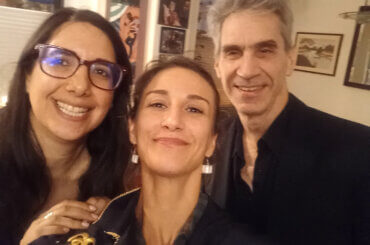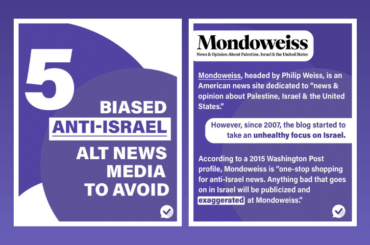We have less than two weeks left to unlock these funds. Can you donate today in honor of Elyse Crystall, Rabab Abdulhadi, and others fighting McCarthyism on campus? A gift of $40, $75 or whatever amount you can manage will make a difference! If you’ve already donated this month, please accept our thanks! And read on to understand why activist professor Elyse Crystall supports Mondoweiss‘s coverage of ChangeMakers. |
As an academic and an activist, I believe justice in Palestine depends on changing minds in the U.S, which is the reason why Mondoweiss is of such value to me – and I urge you to join me today in supporting their work.
You are, I’m sure, well aware that while repression in Palestine increases, here in the U.S. we see greater awareness of the horrific conditions in Palestine. More people today understand that U.S. policy underwrites and U.S. taxpayer dollars fund the violation of Palestinian human rights. I have personal experience of how Mondoweiss’s coverage is critical in this process of increased understanding, and that’s why I’m asking you to contribute today.
Last spring my campus, the University of North Carolina at Chapel Hill, came under attack when the Duke-UNC Consortium on Middle East Studies hosted a conference called “Conflict over Gaza: People, Politics, and Possibilities.” As the faculty advisor for our campus’s chapter of Students for Justice in Palestine (SJP), I was not entirely surprised. I know how long and hard campus groups have fought to destigmatize support for Palestinian rights and to dismantle the notion that criticism of Israeli state policies equals anti-Semitism.
A pro-Israel blogger generated controversy by distributing to local news media an edited video of a brilliant satirical performance by Palestinian rapper Tamer Nafar. Prompted by a local right-wing legislator, Trump’s Department of Education (DOE) launched an investigation. Mondoweiss reported on the results, released in September. The DOE conditioned any future Title VI funds on our providing detailed information about how each activity of our program “advances the national security interests and economic stability of the United States.”
Obviously, this warning sought to intimidate all area studies programs nationally, and specifically Middle East studies, by making an example of ours. In response to the Trump administration’s clampdown on our program, over 350 outraged professors nationwide signed a petition declaring their support for Palestinian rights and their refusal to be silenced. And Mondoweiss spread the word.
These attempts to silence Palestine solidarity in the U.S. have culminated in the Executive Order signed this month, aimed at providing easier legal paths for claims of anti-Semitism on campus. And you know as well as I that neither faculty nor students will go quietly in the face of this repression—and Mondoweiss will help alert the public at large of our resistance.
Over a dozen Israel-aligned groups make it their job to monitor pro-Palestinian academics, many of whom have been fired as a result. Pro-Israel groups’ tactics include media smears on Israel’s critics, labeling them anti-Semitic; efforts to rewrite university policies or state laws to penalize criticism of Israel; and pressure on donors and administrators. I’m Jewish and still I feel the chill of censorship, and I know that the threat to those of Palestinian descent is much, much greater.
Earlier in the year Mondoweiss shared with you the fight of my friend Dr. Rabab Abdulhadi, who was sued multiple times for creating a “threatening environment” on her campus. Her own university, San Francisco State University, retaliated against her because of her passionate pro-Palestine positions. At Fordham University, students attempting to form an SJP chapter faced an intense, two-year legal battle.
As campus activism continues to come under attack, more than ever we need you to stand in solidarity with us. They won’t stop trying to silence us, leveraging their influence and weaponizing anti-Semitism.
We rely on Mondoweiss to tell the truth loud and clear and to help us track the movement for justice in Palestine in the U.S. and globally.
The students, faculty, and staff at our universities are ChangeMakers because right now U.S. campuses are crucial arenas in the struggle for Palestine. Campus advocates fight effectively with historical facts, critical analysis, and persuasive rhetorical skills—and that inspires others to fight. That’s one of the reasons why those who seek to defend the indefensible focus their efforts on universities.
Universities are under attack, and sometimes we win – as the students at Fordham University finally did! These success stories inspire us all, and we are indebted to Mondoweiss for informing us of each other’s struggles and victories.
Please join me in supporting Mondoweiss, so that thorough coverage read by hundreds of thousands can continue to advance our work for real change. Your donation today makes a difference.



“The DOE conditioned any future Title VI funds on our providing detailed information about how each activity of our program ‘advances the national security interests and economic stability of the United States.'”
It definitely advances America’s national security interest for its citizens to learn the facts about our nation’s friends and enemies, especially those related to national security. Col. Lawrence Wilkerson, an insider’s insider, has explained why Israel has significant national security liabilities for the U.S. “Israeli influence on U.S. foreign policy” Col. Lawrence Wilkerson”
https://www.youtube.com/watch?v=Sox6MoiiMic
Given Col. Wilkerson’s deep experience and impeccable credentials, perhaps a course could be built around his analysis (perhaps inviting him to give a keynote lecture.) Then add other material as evidence, for and against the accuracy of his analysis. The course would strive for evidentiary thoroughness, not political balance. The evidence it contains would be handled using the general rules of evidence current in law and science.
Censorship is terrible!